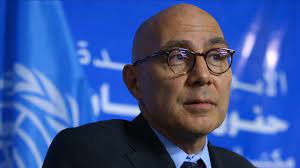APA-Niamey (Niger) – In a statement issued on Friday, the United Nations High Commissioner for Human Rights, Volker Türk, expressed deep concern about the situation in Niger since last month’s military coup and called on the junta to immediately restore constitutional order and release former President Bazoum Mohamed.
By Aboubacar Yacouba Barma
“Niger is one of the poorest countries in the world and extremely vulnerable to climate change. The population has already suffered many hardships over the years,” said Volker Türk, for whom “today even the people elected by the people of Niger to find a way out of their misery have been forcibly removed and are being held by those responsible for the coup, thus calling into question the constitutional order.” According For the UN human rights chief, “they must be immediately released and the path to democracy restored.”
According to the statement, almost half of the population lives in extreme poverty (on less than $2.15 a day) and millions are dependent on humanitarian aid.
Since the coup, their situation has been exacerbated by the closure of the country’s borders, the paralysis of trade, severe power cuts and rising food prices.
The High Commissioner furthermore called for “full and unfettered humanitarian access, including goods, flights and personnel, to allow food, medicine and other basic necessities to enter the country.
In the note, Mr. Türk also expressed concern about the coup leaders’ decision to charge President Mohamed Bazoum and others working with him with treason.
“This decision is not only politically motivated against a democratically elected president, but also has no legal basis as the normal functioning of democratic institutions has been obstructed,” he charged.
He also expressed concern about “the repression of civic space,” including allegations of intimidation of journalists, the ban on international media, and other restrictions on freedom of expression and public assembly.
Concern about trend towards unconstitutional changes in West Africa
The UN High Commissioner for Human Rights also said that the recent trend towards unconstitutional changes of government by military forces in West Africa – Niger’s coup is the sixth in the region in the last three years – is deeply worrying, and that the consequences are always borne by the local population.
“The very notion of freedom in Niger is at stake,” he stated, while noting that Bazoum’s victory in 2021 marked the first democratic transition in the country’s coup-ridden history. “Generals cannot arrogate to themselves the right to defy the will of the people on a whim. The rule of the gun has no place in today’s world,” he said.
On July 26, a military junta seized power in Niger, overthrowing the regime of Bazoum Mohamed, who had come to power in April 2011 in the first democratic transition in the country’s political history.
Since then, and despite appeals from the international community, the former head of state, accompanied by his wife and son, has been detained by the military at the presidential residence in Niamey.
Several other dignitaries of the former regime are also in the hands of the coup plotters, who are refusing to restore constitutional order and are gradually establishing a military transition at the head of the country, despite the injunctions of ECOWAS, which has threatened to use force.
Earlier this week, the junta announced that it had “the necessary evidence” to bring the former head of state and his accomplices before the competent courts for “high treason” and “undermining state security.”
Last week, the United Nations High Commissioner for Human Rights expressed concern about the detention conditions of the former president’s family.
“I am extremely concerned about the rapid deterioration in the conditions of detention of the President of Niger, Mohamed Bazoum, his wife and son, who are being arbitrarily detained. Credible reports I have received indicate that the conditions in which they are being held may constitute inhuman and degrading treatment in violation of international human rights law,” said Volker Türk, expressing alarm and reminding those responsible for the President’s detention of “their obligation to ensure full respect and protection of his human rights and those of all other detainees.”
AYB/ac/lb/as/APA


